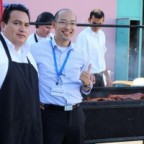There is a word in Japanese that I really dislike: “IIna”. IIna is said when someone praises others or when one is jealous of another person. The meaning changes depending on how you use it, therefore, the impression of the word differs from person to person. Mine is bad. Luckily, I have spent a few years being told “IIna”. However, the unpleasantness grew through the years and I would like to explain why this happened.
I was scouted by a talent agency in Harajuku when I was in Tokyo for a speech contest. I was 15. My mom and I decided to sign the contract because we thought it would be a good experience, and a source of financial support. By the time I entered Sophia University, I started working with the entertainment agency. I first started doing lessons to train basic skills of expression, such as vocal training, acting and dancing before entering Sophia, and went to auditions as a freshman. Luckily enough, I obtained considerable work during the first year. I did television, radio, cable TV and more. It was a great experience for me to know this kind of world. It felt like a dream, like it was not real. It was unimaginable that my voice would be heard by thousands and thousands of people. My friends from my hometown sent me messages to tell me they had watched my show, my parents enjoyed watching me on television because they knew it meant I was doing well, and I was happy to see them smiling as a result of my work.
Still, besides all of the praise I got from others, something felt wrong inside; like a kind of dilemma taking hold inside of me. Even If I was on one of the biggest programs in Japan, I couldn’t be satisfied. Although it might be difficult to understand, I discovered a simple explanation—I wasn’t interested in being famous. The reason I came to Tokyo was to enter university. It wasn’t an easy thing for a poor girl from Shizuoka to enter Sophia. I worked hard during high school, never letting anyone get ahead of me in grades. I dreamed of challenging for the United Nations Internship, I wanted to become one of the counselors of the “High School Diplomat” program that I participated in. All of those things were goals I had since high school. My work schedule never let me accomplish this. I preferred going to class than to work, I admired my friends for simply doing what they wanted. In that respect, I was the one who thought “Iina” to others. Their freeness and happiness sometimes left me in solitude.
Six months into my new working life, my motivation began to decline. I couldn’t go to class much, I didn’t see my friends and all of my late-night work left me exhausted. The agency told me I should value both my job and studies, but technically, that was impossible. I couldn’t even plan dinner with my friends because the agency controlled my schedule. My time and life belonged to them. Besides their “schedule-controlling”, there was a factor that gradually came to light that later would become the main reason to quit. It was the biased understanding of “attractiveness”. I had to perfectly fit into the “ideal” body image and beauty standards. They forced me to be “skinny” to become more “beautiful.” My manager checked my body every time I met him. He would look at my body while I didn’t notice, ask my weight at every shooting, complain about my body parts and choose clothes that covered those parts he didn’t like, stared at me if I choose a “fatty obento”, and more. He checked me literally, “every time”. I was constantly under pressure of not being ideal and being inferior to others. I didn’t have any control over my own body. I had to be fit for others, not for me. In addition to this, my appearance as “half” was used commercially, in a way I didn’t like. Usually, “half talents” tend to be sold with a fixed stereotype of either being “stupid and pretty” or “super intellectual and pretty”. I wasn’t either of them, but my image as an artist was the latter one: “the pretty half girl who can speak 3 languages”. I wanted to be presented as I am, making people happy with my own qualities of being “Serina”. Each position I had in the program was the “half seat”. The position I could have just because of my race, not myself. I did understand how much my race would benefit the agency because of its rareness. Nevertheless, the discomfort I had was significant.
Would you still like to say “Iina”? This is the reality of the Japanese entertainment industry. My industry looks luxurious, and as a matter of fact, it is. Thanks to my work, I had the chance to meet celebrities, report special events and be the host of a worldwide sporting event. All of these events have become a significant experience in my life. However, this is just the tip of the iceberg. The work we do is for the viewing public. It is obvious that people work hard in order to deliver satisfaction and impression to viewers. As a result, the impression people get from the entertainment world leans towards luxury. Working in this industry taught me one thing: the brighter it looks, the darker it gets.
I meant “dark” as the implication of how much the stereotypes and thoughts of people are biased. Many artists, especially women, are forced to work so much on fitting into the beauty standards this country has. I strongly doubt the idea of making all women look the same, since the entertainment world should be a place where “individuality” is accepted. Besides, what I am most concerned about is that the contradiction I mention here is surprisingly not discussed or cared about much by the public. Many women my age still admire artists who conform to these beauty standards. As a person who was inside the system that creates these images, I felt terribly powerless to change them.
Three years have passed since I started that job. Last October, I had the chance to discuss my career with the agency since my last program was going to end. Although I considered all the experiences I already had, and all the opportunities I could have in the future, I decided to quit my career in the industry. I thought once again about my life and decided to look for something I felt more passionate about. Many people stopped me and told me I would lose many things. I heard a lot of “Mottainai” at that time. Anytime a person told me “Mottainai” with their sad face, my heart hurt a little, and I shut my mouth in order not to argue. It was a pity that they couldn’t understand my decisions and that I couldn’t explain it much either. However, my decision was not a mistake. I have never regretted it.
Let me come back again to the phrase “Iina”. We tend to admire what we do not have. We tend to build our own perspectives towards things that cannot be accomplished. Longing and admiration can be offensive, depending on how you tell it. These emotions come from one place, comparison. We often compare ourselves to people. Everybody has compared themselves at least once in their lives, and we should know how that emotion changes people. Comparison can change its form to jealousy, respect, admiration and more. The way we change that emotion reflects the level of personality we have.
Choices are selected in many ways by many people. The path you choose is yours and nobody should say there is anything wrong with it. Since I had the experience to make a big decision in my life, I think more about “admiration”, “Iina” and the way we see other people’s actions. By having the chance to work in the media and looking at people working in many industries under a variety of circumstances, I realized and now believe that each career an individual has is “valuable”. If we accept our own path, we would be able to respect people’s choices and values more. Stop once and try to think before telling someone iina. Nobody in this entire world should be pressured by other people’s thoughts, because each individual has their one and only life.
Serina Sugiyama is a 4th-year student in the Department of English Studies. This essay originally appeared in the 4th issues of Angles, the student journal of new writing.



















